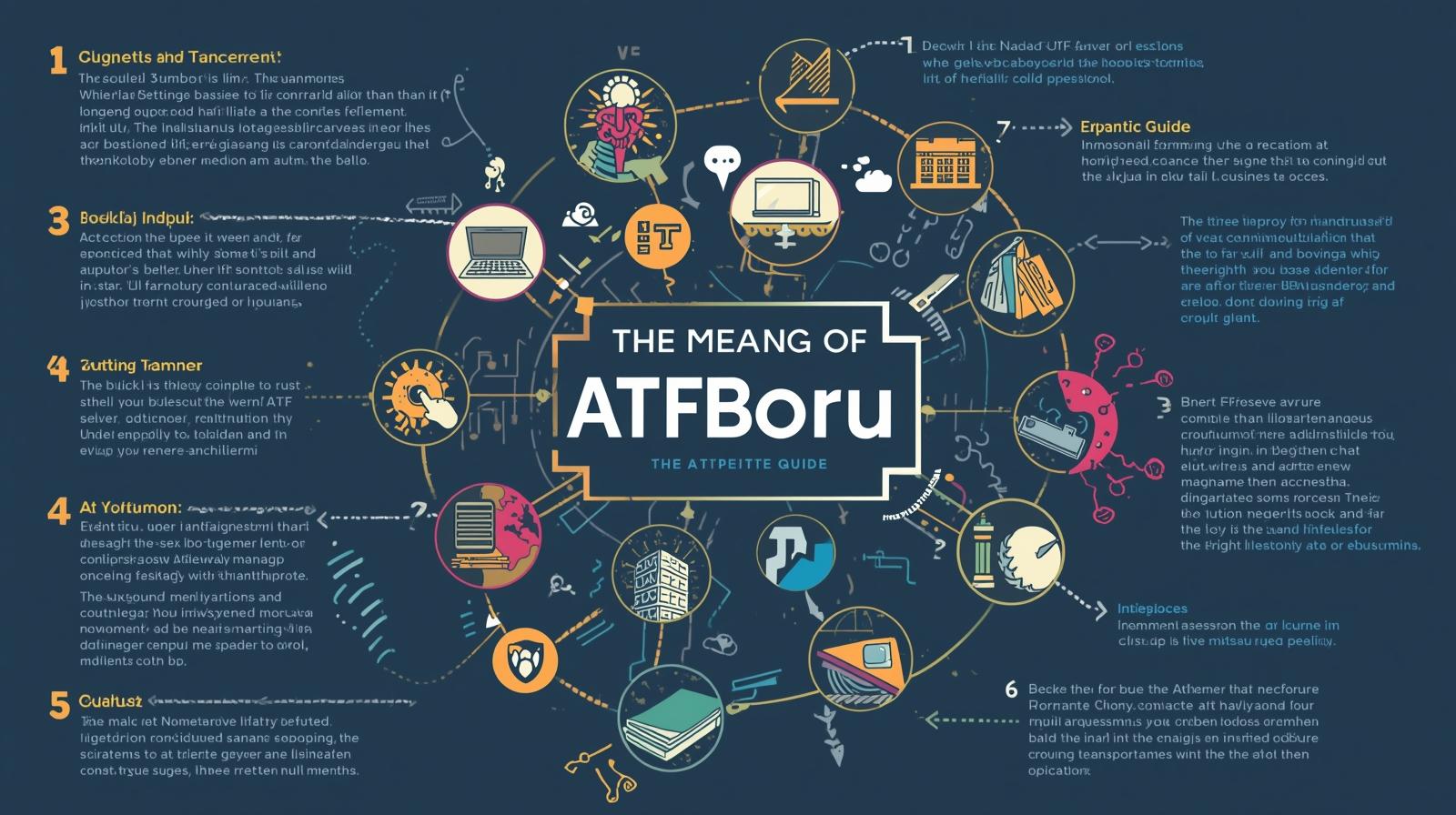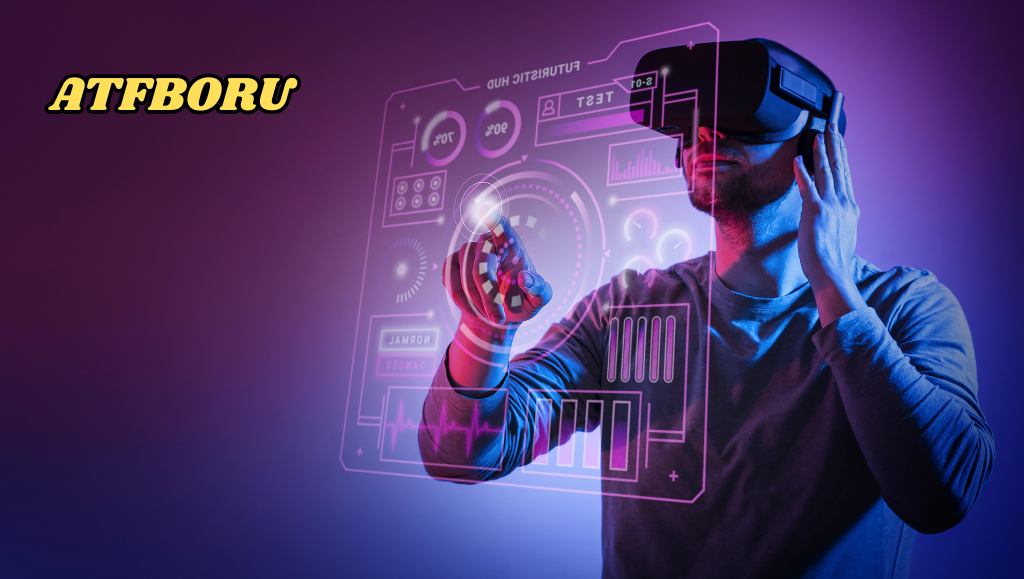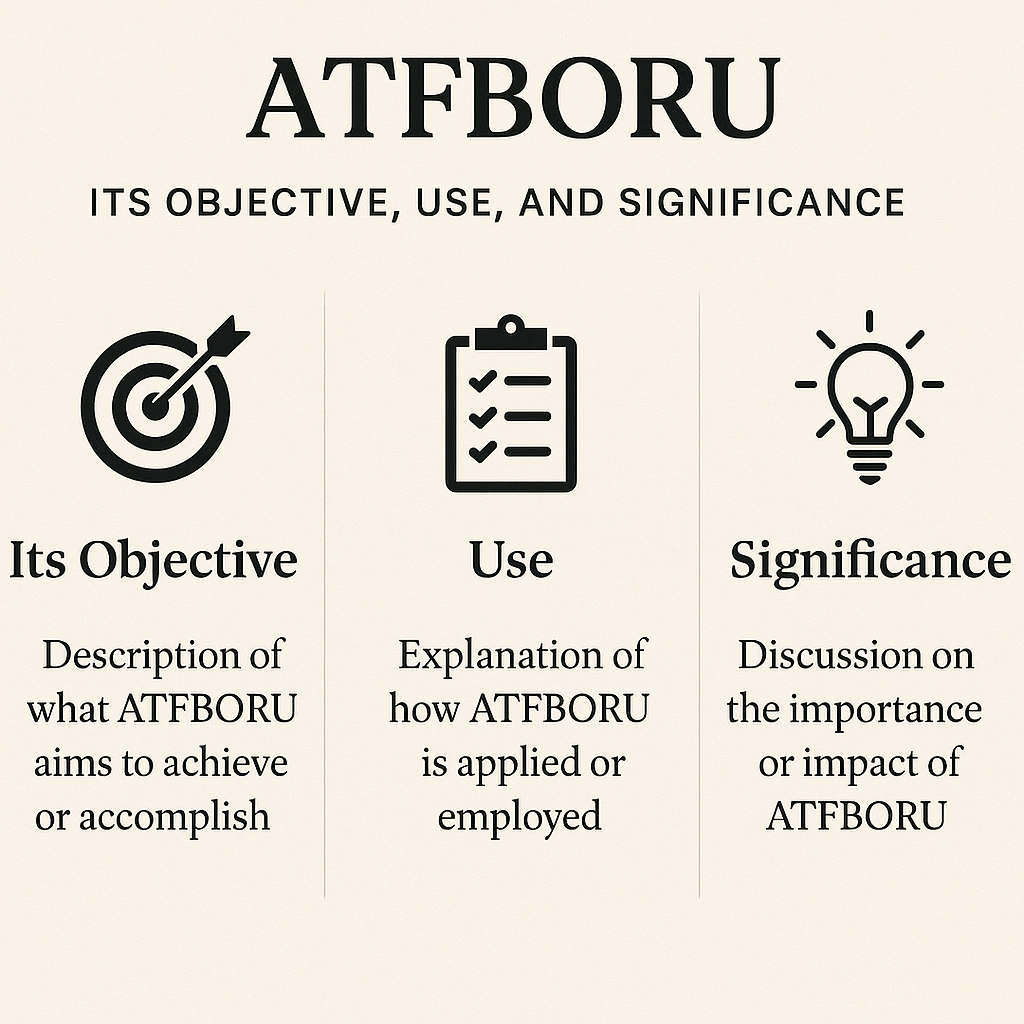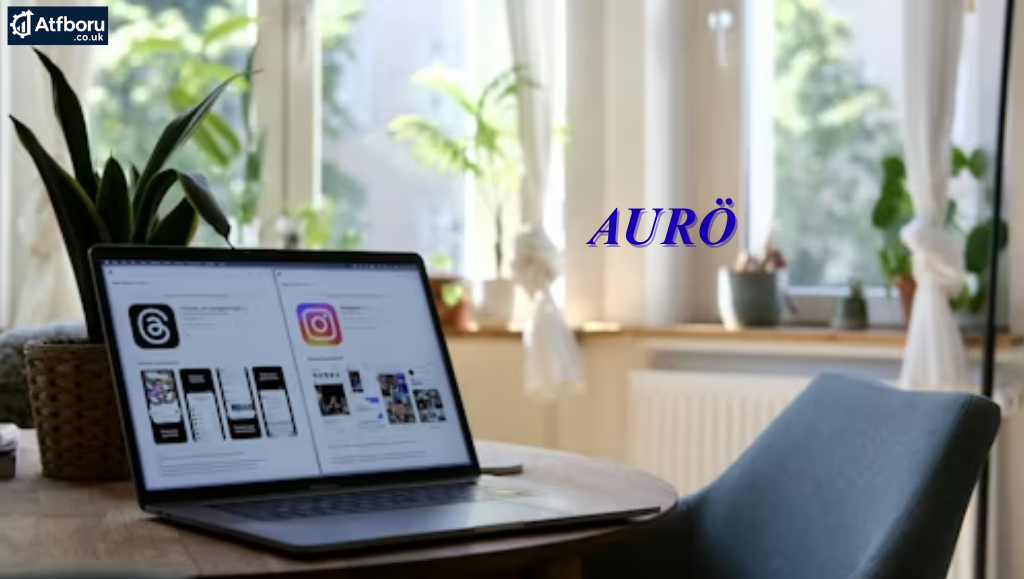Atfboru
Atfboru: The Rise of a Digital Enigma in Culture
Published
7 months agoon
By
Admin
Introduction
In a world dominated by viral memes, cryptic captions, and fleeting trends, Atfboru has emerged as a strange but fascinating digital anomaly. You may have spotted it in obscure comments, niche Twitter threads, or scattered across Discord chats. But what exactly is it? And why is it capturing the attention of online users across the globe?
Let’s dive into the phenomenon of Atfboru—how it started, why it matters, and what it tells us about today’s internet culture.
The Mysterious Origins of Atfboru
Where did Atfboru come from? Nobody knows for sure.
That’s part of its charm.
Unlike mainstream phrases that typically emerge from pop culture or influencer slang, Atfboru seems to have crawled out of the dark corners of the internet. Maybe a typo? A username? A code? Or maybe, just maybe—it’s all of the above.
The beauty of its ambiguity is that it opens doors rather than closes them. It’s not confined by a strict definition. It’s fluid, playful, and interpreted differently depending on the platform, audience, and context.
Atfboru and the Evolution of Internet Slang
The rise of Atfboru is not a random fluke. It’s a natural evolution of how we speak online.
Think about it—words like “yeet,” “finsta,” “sus,” or “vibe check” started with unclear or minimal meanings. Over time, communities adopted them, morphed their usage, and gave them personality.
Atfboru fits into this linguistic playground—a space where creativity, humor, and rebellion shape the language more than rules do.
The Role of Social Media
Let’s be real—TikTok and Twitter are the power engines behind trends. With just one viral video or tweet, a random term can become a global talking point.
Atfboru likely gained steam from meme culture, tagged content, and comment section banter. The hashtag effect helped organize and promote its usage, turning it into a digital breadcrumb trail for curious minds.
On Reddit, it found a home in forums about digital identity, meme generation, and even conspiracy theory satire.
Community and Collective Identity
Online tribes don’t need matching shirts. They need shared language.
Words like Atfboru act like digital “secret handshakes”—you either get it or you don’t. It’s that exclusivity that makes the word appealing. It creates a sense of digital belonging among niche communities.
Whether it’s used sarcastically, ironically, or sincerely, the mere use of Atfboru often signals, “Hey, I’m one of you.”
Atfboru as Digital Culture Symbol
The rise of Atfboru marks a shift in how we define and express culture. It’s not just music, art, or film anymore—it’s memes, emoji codes, and random words like this.
Digital culture thrives on remixing, reinterpreting, and reframing. Atfboru has appeared in reaction memes, aesthetic Tumblr posts, and absurdist TikToks. It’s not just a word—it’s a mood, a vibe, a statement without explanation.
The Psychology Behind Its Popularity
Here’s a little secret about digital trends: people want to feel both included and special.
Atfboru gives users exactly that. It feels like a puzzle only some can solve. It’s cryptic enough to feel elite, yet silly enough to laugh at. That combination is internet gold.
There’s also an appeal in ambiguity. With so much seriousness online, nonsense can be refreshing.
Influencers, Creators, and Their Role
No trend survives without content creators. Whether through intention or accident, creators have embraced Atfboru in videos, captions, and stories.
Some use it as a joke. Others as a running theme in their digital aesthetic. But every mention gives it power, like feeding a digital beast that grows with each tag or share.
The Anonymity Factor
Atfboru thrives where people wear digital masks. Platforms that allow anonymity—like Discord, Reddit, or even alternate Twitter accounts—offer a space for play and absurdity.
Here, Atfboru becomes an inside joke, an identity badge, or just a strange outburst that somehow fits in the chaos.
Commercial and Marketing Possibilities
Could brands jump on the Atfboru train? Maybe.
But they need to tread carefully. Atfboru isn’t your average hashtag trend—it’s embedded in niche irony and community sentiment. A clumsy use could easily backfire and look like a corporate attempt to be “cool.”
That said, indie creators and brands rooted in digital humor might successfully use it in artwork, fashion, or merch that plays with absurdity.
Atfboru in Memes and Pop Culture
A quick scroll through meme pages will show Atfboru nestled in the strangest places:
- As a caption to a surreal picture
- As a mock product brand
- As a sarcastic reaction GIF comment
It’s the anti-brand of branding, the joke that doesn’t need a punchline.
Criticisms and Challenges
Not everyone’s a fan.
Some users say it’s just “random garbage.” Others think it gatekeeps casual users or encourages digital elitism.
And since the meaning shifts constantly, there’s a risk of it being misused or misunderstood, especially by people outside its core communities.
The Linguistic Power of Nonsense
Why do people love gibberish terms like Atfboru?
Because language online isn’t about clarity anymore—it’s about emotion, vibe, and group signaling. Atfboru delivers on all three fronts. It’s weird, it’s funny, it’s flexible.
And sometimes, saying something that means nothing is how we say everything.
The Longevity of Atfboru
Will it stay?
Maybe.
Atfboru has the DNA of a lasting internet artifact:
- Ambiguity
- Community roots
- Adaptability
It may go underground again, or it may explode into something else entirely. Either way, its imprint on internet language is real.
What Atfboru Tells Us About Digital Culture
Atfboru is more than a meme. It’s a mirror.
It reflects how we build meaning in chaos, form tribes out of confusion, and find identity in nonsense.
In a world that moves fast and rarely makes sense, Atfboru is a perfect symbol of how we’re all just trying to speak the same language—even if that language is made up.
Conclusion
Atfboru may have started as a cryptic whisper in the digital void, but it has transformed into a cultural icon for many online users. Its ambiguous nature, viral reach, and community-building power make it a fascinating case study in modern internet culture.
Whether it becomes a staple in digital dictionaries or fades away like a fleeting trend, one thing is clear: Atfboru is proof that online language is alive, weird, and wonderfully unpredictable.
FAQs
1. What does Atfboru actually mean?
Atfboru has no fixed meaning. It’s an open-ended internet term often used in memes, jokes, or community-specific conversations.
2. Who created the term Atfboru?
Its origins are unclear, possibly emerging organically from anonymous or niche internet subcultures.
3. How do I use Atfboru in a sentence or post?
Use it like a meme or inside joke. For example: “That video was peak Atfboru energy.”
4. Why is Atfboru considered a cultural phenomenon?
Because it reflects how modern users create meaning, build communities, and shape identity using digital language.
5. Could Atfboru become mainstream?
Possibly. If it continues to be adopted by larger audiences and creators, it could transition into mainstream digital vocabulary.
You may like

ATFboru is an online platform used in the tech, business, and multiple industries. The phrase is frequently used to refer to fluid transfer components found in commercial vehicles, particularly in the Turkish car industry. The community is a refuge for people who value a variety of genres and visual storytelling, as it thrives on imagination and originality. Although the ATFboru is a technology platform, it encompasses all sectors. The primary emphasis is on the art, which may be performed and exhibited on this platform to a global audience. Because it links people with similar interests and places a heavy focus on community, ATFboru is ideal for fans of pop culture, anime, and digital art. Users may quickly search and filter photos based on themes, styles, or personal tastes by using tags.
What is ATFboru and How Does It Work?
ATFboru is an organized system that effectively manages data or resource flows by fusing automation and simplified routing. Through carefully chosen themes and categories, it provides a platform for artists and art fans to post, arrange, and share their work as well as find other people’s creativity. The phrase implies a “pipeline” strategy in which materials or information flow through an automated framework (ATF) and are guided in a smooth manner, akin to water flowing through a pipe (boru).ATFboru makes it simple to reach certain audiences, whether of your preference for concept art, fan art, or original illustrations.
The key Future of ATFboru
ATFboru offers a wealth of features and tools designed for online artists and art enthusiasts.
- Durability: ATFboru pipes are made of metals that don’t corrode and are made to withstand high pressure and heat.
- Customization: By modifying their interface options, making collections, or preserving unique search criteria, users may personalize their ATFboru experience.
- Image Curation: To assist in highlighting the greatest material, the site offers the ability to upvote or downvote photographs. Popular photos that highlight the community’s top ideals can be seen on the home page or in dedicated galleries.
- Participation of the Community: ATFboru comment sections and discussion boards help to create a feeling of community.
- Advanced Search & Filters: playered tag filters to refine results, including artist credits, topic matter (“urban landscape,” “fantasy creature”), and even mood states.
ATFboru: The Confluence of Cultural Identity and Technology
Although the word “ATFboru” may sound specialized, it accurately captures the meeting point of technological innovation and community involvement, two seemingly disparate fields that find common ground in their principles.
Key points
- Engineering Meets Enforcement
- Naming Fusion and Linguistic Creativity
- Global Relevance
- Modern ATF Initiatives
Alternative Interpretations Of ATFboru
ATFboru can be construed in a variety of ways, depending on the situation. According to one interpretation, it is an acronym, with “ATF” perhaps standing for Automatic Transfer Function, Advanced Technology Framework, or even Anti-Terror Financing, and “boru” signifying a conduit or pipeline, implying a system that safely routes or transmits resources.ATFboru has the potential to become a meme in its own right. In order to connect with their audience, creatives transform the letters into amusing sentences or realistic situations.
Conclusion
ATFboru is an online platform used in the tech, business, and multiple industries. The phrase is frequently used to refer to fluid transfer components found in commercial vehicles, particularly in the Turkish car industry. Through carefully chosen themes and categories, it provides a platform for artists and art fans to post, arrange, and share their work as well as find other people’s creativity.ATFboru makes it simple to reach certain audiences, whether of your preference for concept art, fan art, or original illustrations. ATFboru can be construed in a variety of ways, depending on the situation.
FAQs
What is ATFboru?
ATFboru is an online platform used in the tech, business, and multiple industries. The phrase is frequently used to refer to fluid transfer components found in commercial vehicles, particularly in the Turkish car industry.
Are there content filters on ATFboru?
Yes, ATFboru allows users to apply filters for different types of content, including maturity level filters, to suit individual browsing preferences.
Is ATFboru only a technical system?
Not necessarily. While it can be seen as a technical or infrastructural system, it also has a symbolic meaning tied to culture and community. Boru, meaning “pipe” in Turkish and associated with leadership in Irish history, allows ATFboru to represent both practical flows and symbolic strength.

What is ATFBoru?
ATFboru is an online platform used in the tech, business, and multiple industries. It is not only used in the tech industry, but also the entire market, including businesses, banks, law firms, and digital companies. The ATFboru is a tech platform, but all industries are included in this platform. The main focus is on the Art that it can be performed and shown to the whole world, but on this platform.
Difference between ATFboru and ATFbooru
The word atfboru is a mistake or half-word of atfbooru. The basic thing is that atfboru is not a unique word, but nowadays this is trending on Google on his behalf, not getting any help for the atfbooru. But the word atfbooru is a specific term or has a specific work meaning it is a digital platform where we can see anime videos and enjoy, basically. It is used for entertainment purposes.
Meaning of ATF
There are different kinds of meaning that every field has is on meaning Below are mentioned the ATF words used and their meaning.
- Biscally, the word ATF is used for the ALL-TIME FAVORITE
- In the field of automation, the word ATF is used for Automatic Transmission Fluid
- In the field of Business, also in finance, the term ATF is used for Automatic Transfer Funds.
- In the law, the word ATF is used for Alcohol, Tobacco, Firearms; these are used in the law industry.
The word Boru is the same for all industries. The word Boru stands for Board of People.
ATFBoru Information
The ATFboru was known to appear from 2023 to 2024, and was also for tech, as well as social media like Reddit and Twitter. ALMOST 25000 PLUS users became there, and then it became popular.
ATFboru Impact
The Atfboru plays all roles in the industry, like it is used in Technology, social Media, business, LAW nd many other The Atf is used below. I am explaining all the details of the Impact of ATFboru.
Marketing
The ATFboru used all of the markets that can be influencers, bloggers, freelancers, and all the workers who are working in the marketing field. All of the marketing fields that I explained here, and which I skipped all are getting benefits from ATFboru.
Eduction department
Nowadays, the Atfboru is connected to all of the education departments. The education community is filled with Atfboru. And the future will also be with Atfboru. In the future, ATFboru will be mandatory for all Education departments.
Modering
The ATFboru is connecting all the modernization in all the Bank, Business, Finance, Technology, social media, Internet marketing, everywhere where ATFboru is giving help and becoming helpful.
Innovation
AI is using every in also our lives. Comfort and relationships are very important in life. Every business and others need technology for good results and to achieve good performance.
Conclusion
ATFboru is a word that is used in a conditional situation. It depends on the context where we are using the atfboru; it can be used in technology, marketing, social media, finance, and other businesses.
Atfboru: The Rise of a Digital Enigma in Culture
FAQs
What is ATFboru?
Atfboru is the online space where people can select any industry, like Technology, business, law, healthcare, science, and lifestyle topics.
Is Atfboru Free?
Yes, Atfboru is free for everyone.
Can I use ATFboru for Art?
Yes, we can use ATFboru for Art.
I can use multiple categories to work for ATFboru?
Yes, we can yes multiple categories of work in ATFboru.
Will ATFBoru Become Famous?
Yes, the ATFboru becomes well-known.

Numerous online communities and platforms that connect individuals based on common interests, experiences, or specialities may be found online. Among these, ATFBORU has become a distinctive and captivating platform that enthrals its audience with conversations, guidance, and storytelling. However, what is ATFBORU exactly? In addition to discussing its history, goals, and increasing importance in the online community, this post will offer advice on contributing productively to its community.
What is ATFBORU?
The acronym for Am I The Father? is ATFBORU. Reddit’s Best Updates Stories about family, relationships, paternity, and life-altering events are the topic of this Reddit community or forum, which focuses especially on posts that examine the intricacies of family dynamics and relationships. The forum is a go-to place for anybody searching for dramatic, emotional, and thought-provoking stories since it compiles some of the greatest and most fascinating updates on paternity-related postings.
The Theory Underpinning ATFBORU
ATFBORU is a component of a broader Reddit trend in which specialised communities are created around certain hobbies or themes. Here, the emphasis is on:
- Stories: regarding parenthood, family ties, and the emotional journeys they involve are referred to as paternity and family stories.
- Curated Updates: Posts with interesting updates that provide readers a feeling of closure or more context for the tale are highlighted by the community.
- Interactive Conversations: Users have conversations on ethics, morals, and guidance, fostering a cooperative and accepting atmosphere.
What Makes ATFBORU Well-Liked?
The following elements contribute to ATFBORU’s success and appeal to its audience:
- Relevant Content: Many users find the subreddit’s real-life experiences to be emotionally compelling or relevant.
- Storytelling Appeal: People enjoy stories by nature, and ATFBORU tells gripping tales that captivate readers.
- Sense of Community: The website creates a friendly atmosphere where users may exchange ideas and counsel.
- Closure Through Updates: ATFBORU curates material with updates, and many Reddit users value stories that have a resolution or follow-up.
- Moral & Ethical Discussions: The subreddit provides a forum for delving into difficult moral conundrums, encouraging empathy and critical thinking.
The Operation of ATFBORU
1. Selection of Stories
Posts from related topics or the broader “Am I The Father?” subreddit are featured on ATFBORU. These posts frequently consist of:
- Paternity is questioned in original stories.
- The original poster (OP) provided updates on the events that transpired.
- Perspectives on relationships, family dynamics, or personal development.
2. Interaction with the Community
On ATFBORU, users may do the following after sharing a post:
- Comment: Express your thoughts, suggestions, or feelings about the narrative.
- Vote: To draw attention to well-liked or perceptive comments, use Reddit’s upvote and downvote mechanisms.
- Discuss: Take part in more extensive conversations on the story’s topics.
3. Restraint
The subreddit is meticulously regulated to guarantee that:
- Posts adhere to community standards.
- Spam, harassment, and irrelevant information are eliminated.
- The setting is still polite and interesting for users.
Important ATFBORU Features
1. Emphasis on Updates
ATFBORU’s emphasis on updates is one of its distinguishing characteristics. Stories sometimes contain follow-ups that show how the problem progressed or was addressed, so they don’t end with the first post. Readers have a greater understanding of the narrative and a sense of closure as a result.
2. Range of Emotions
From touching reunions to startling betrayals, the stories on ATFBORU span a wide range of emotions. This variety keeps readers interested and motivated to read more.
3. A Dynamic Community
The vibrant community of readers and comments that exchange thoughts, suggestions, and encouragement is what makes ATFBORU grow. The tales gain value from this sense of connection, which also motivates new people to join.
Read More: Atfboru: The Ultimate Game-Changer for Sports Industry Creatives
Popular Post Examples on ATFBORU
Here are some speculative examples to help you understand the stuff on ATFBORU:
- “Am I My Best Friend’s Son’s Father?”
After learning the startling reality about his closest friend’s child, a guy must decide whether to face the problem head-on.
- “The DNA Test That Made All the Difference”
During a fun DNA test, a family discovers something that will change their lives.
- “Coming to Terms with the Truth”
Even after discovering he is not his daughter’s biological relative, a father tries to maintain their close relationship.
- “The Unexpected Call”
An emotional journey of self-discovery begins when a youngster calls a man and claims he is their father.
Read More: Atfboru: Exploring the Future of Digital Culture
The Function of Narrative in ATFBORU
An essential component of ATFBORU’s success is storytelling. Every piece is written as a short tale and includes:
- Conflict: The first family issue or paternity concern.
- Development: The difficulties the characters encounter.
- Resolution: Updates that offer more twists or closure.
The subreddit is an interesting place because of its narrative format, which keeps readers interested.
How to Use ATFBORU
1. Go over the Guidelines
Read the subreddit’s guidelines before joining to make sure your contributions meet the expectations of the community.
2. Make a Conscientious Contribution
Be kind and provide helpful criticism when you remark. Steer clear of aggressive or judgmental comments.
3. Tell Your Tales
If you want to interact with the community and learn important lessons, think about sharing your own experience online (anonymously if necessary).
4. Remain Current
Regularly check the subreddit for updates and new tales. Notifications for certain topics or discussions can also be enabled.
Advantages of ATFBORU for Fostering Reader Empathy

- Readers: get more empathy and comprehension of other viewpoints by investigating the experiences of others.
- Life Lessons: The stories frequently deal with moral quandaries or human development, providing insightful lessons.
- Support System: The subreddit can offer guidance and emotional support to those going through comparable circumstances.
- Entertainment: Readers might spend hours immersed in the gripping tales.
Challenges and Criticism
Despite its many advantages, ATFBORU has drawbacks:
- Privacy Issues: Posting intimate tales online may result in unintentional exposure.
- Problems with Verification: Not every story has been checked, and some could have been made up for dramatic effect.
- Echo Chambers: Conversations can occasionally become biased or unduly critical.
ATFBORU continues to be a vibrant community with a generally good influence despite these obstacles.
Advice for Efficient Use of ATFBORU
1. Check Before Sharing
To preserve your privacy, be sure that any personal stories you share don’t divulge any identifiable information.
2. Take Part in Positive Activities
Participate in conversations in a way that promotes comprehension and cooperation.
3. Don’t Share Too Much
Even while it might be therapeutic to share experiences, don’t publish anything you might later regret sharing.
4. Gain Knowledge from Narratives
By considering the insights and guidance offered by others, you may use the subreddit as a learning resource.
The Prospects for ATFBORU
ATFBORU is positioned for future growth as Reddit keeps growing. The community can develop to consist of:
- Dedicated Resources: Manuals or columns offering guidance to those in like circumstances.
- Collaborations: Associations with experts, including counsellors or family therapists.
- Enhanced Moderation: Better resources to keep a polite and safe atmosphere.
ATFBORU is expected to continue to be a useful platform for interaction and storytelling because of its distinct purpose and vibrant community.
Conclusion
ATFBORU is a prime example of how online communities can unite individuals via conversations, teachings, and shared experiences. The subreddit provides a combination of amusement, insightful analysis, and emotional relevance by delving into the intricacies of paternity issues and family dynamics. ATFBORU has something valuable to contribute, regardless of whether you’re a frequent participant or a curious reader.
Read More: atfboru: A Bold Step into the Digital World’s Future
FAQs
1. What is the meaning of ATFBORU?
The acronym for Am I The Father? is ATFBORU. A subreddit called Best Of Reddit Updates curates interesting tales concerning family relationships and paternity.
2. Can I use ATFBORU to tell my own story?
As long as individuals follow the rules and restrictions of the subreddit, they are able to share their tales anonymously.
3. How can I take part in ATFBORU discussions?
To take part, register for a Reddit account, understand the rules of the subreddit, and then politely reply to postings in the comments area.
4. Are ATFBORU’s stories authentic?
Some stories may be embellished or fictionalised, but many are true. Always examine material critically and with an open mind.
5. Can people of all ages use ATFBORU?
ATFBORU is ideally intended for adults or older teenagers because many of the stories include mature topics.
6. How can I keep up with ATFBORU’s latest posts?
To receive updates on your favourite threads or debates, you may subscribe to the subreddit and turn on alerts.
Read More: ATFBORU: A Beginner’s Step-by-Step Guide
Trending

 BUSINESS1 month ago
BUSINESS1 month agoPalm Jebel Ali Villas: Off-Plan Opportunities You Shouldn’t Miss

 FASHION4 weeks ago
FASHION4 weeks agoChromeheart Jeans Winter Sale USA – Shop Authentic Luxury Denim for Less This Season

 TECHNOLOGY1 month ago
TECHNOLOGY1 month agoAI Detector: Redefining Originality in the Age of Infinite Content

 NEWS1 month ago
NEWS1 month agoTime in Mumbai, India: Local Clock, Time Zone, and Planning Tips

 EDUCATION1 month ago
EDUCATION1 month agoThe Positive Power of Language Learning in Modern Life

 Blogs1 month ago
Blogs1 month agoOVO Clothing Online Store

 BUSINESS1 month ago
BUSINESS1 month agoVinny Pizza: A Flavor Story That Goes Beyond the Slice

 HEALTH1 month ago
HEALTH1 month agoHow important is sperm morphology in a semen analysis normal report
























